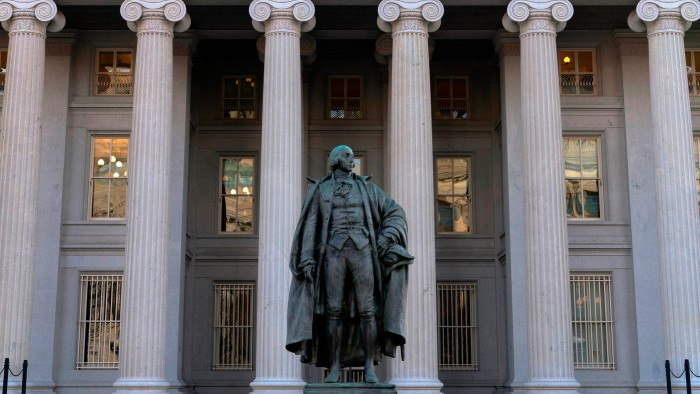Unlock the Editor’s Digest for free
Roula Khalaf, Editor of the FT, selects her favourite stories in this weekly newsletter.
China’s holdings of Treasuries have fallen to their lowest level since 2009, as Beijing holds more of its US government bonds through lower-profile accounts and diversifies into alternative assets.
The value of US sovereign debt held by Chinese investors fell by $57bn to $759bn in 2024, data published by the US Treasury on Tuesday showed. This does not include Chinese-owned Treasuries held in accounts in other countries.
Analysts say the change partly reflects China’s desire to diversify its foreign reserves by buying assets such as gold. But they add that Beijing is seeking to disguise the true extent of its Treasury holdings by shifting them to custodian accounts registered elsewhere.
“China made a decision around 2010 that holding Treasuries was a risk, it looked bad optically that so much of China’s wealth was in the hands of a geopolitical rival,” said Brad Setser, a senior fellow at the Council on Foreign Relations and former US Treasury official.
The decline in China’s holdings was likely to have been exaggerated by some assets being moved to securities depositaries such as Belgium-based Euroclear and Luxembourg-based Clearstream, added Setser, which would boost those countries’ holdings in the official data.
“It has become more difficult over time to track what China is doing and how Chinese flows are impacting global markets,” he said.
Shifts in foreign ownership of Treasuries are closely watched given the US government’s need to finance a vast budget deficit at a time when its central bank is reducing its own holdings of government debt.
China’s reported holdings of Treasuries have fallen by about $550bn since peaking in 2011. UK holdings climbed by $34.2bn in 2024, while Belgian holdings have increased by $60.2bn, and Luxembourg’s holdings gained $84bn. Japan remains the largest holder with more than $1tn.
“Not all US Treasuries held by China are directly hosted in the US institutions,” said a person familiar with the management of China’s foreign reserves. Beijing holds part of its reserve assets through entities such as Euroclear or Clearstream “for the purpose of risk diversification”, they said.
“That said, China’s overall holdings of US Treasury bonds will slowly decrease, the trend is clear, as China continues to diversify its reserve assets,” the person added.
Mark Sobel, US chair of the Official Monetary and Financial Institutions Forum, said the People’s Bank of China had been increasing its exposure to other assets such as gold, typically seen as a haven in times of economic and market stress.
The price of bullion has jumped by about 12 per cent so far this year, in a sign of increasing demand among big buyers. Data from the World Gold Council showed China was the third-biggest buyer of gold in the final three months of 2024, adding 15.24 tonnes to its reserves.
However, while the PBoC’s holdings of gold jumped 13 per cent over the past two years, bullion still represents a relatively small portion of the central bank’s total reserves.
Sobel said the fall in Treasury holdings did not necessarily mean China was selling out of dollar assets in general. Some analysts say China has been increasing purchases of other safe US debt such as agency bonds. Changes in the value of Chinese Treasury holdings also reflect fluctuations in the bonds’ market value.
“Whether they have reduced overall dollar holdings I don’t know, but they are definitely investing in a broader array of instruments through different vehicles,” said Sobel.
The jump in UK holdings of Treasuries had been driven by the flow of money from foreign sovereign wealth funds, wealthy families and hedge funds through London, said analysts, while a similar dynamic was also playing out in Belgium.
Given that yields on gilts are above those on Treasuries, the buyers of Treasuries in the UK are unlikely to be British investors, but rather “it has to do with foreign money [including] Middle Eastern money”, said Andy Brenner, head of international fixed income at NatAlliance.
Setser said hedge funds were likely holding US Treasuries in the UK as part of the so-called basis trade, a highly leveraged strategy in which funds buy US bonds and sell futures to profit from small price differences.
Additional reporting by Haohsiang Ko
Read the full article here




